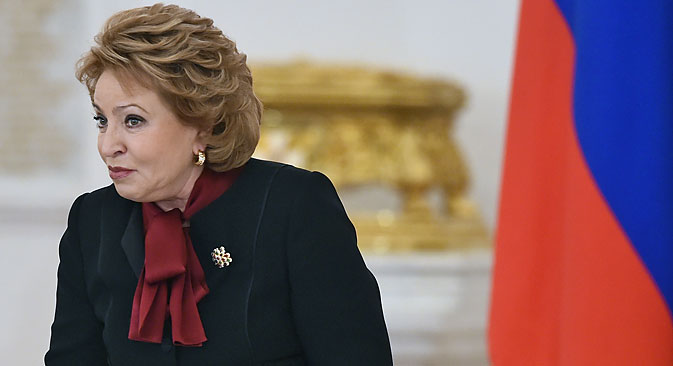
Valentina Matviyenko. Source: Kommersant
KommersantValentina Matviyenko, speaker of Russia’s Federation Council, has spoken about future relations with the United States and the impossibility of returning Crimea to Ukraine in an interview with the centrist daily Izvestiya.
“Both sanctions and visa restrictions are elements of the unprofessional, misguided U.S. policy toward Russia. The people who initiate such decisions in Washington are infected with an anti-Russian virus,” said Matviyenko.
“They are short-sighted because they do not know the history of our country, do not understand the mentality of the people, our traditions. They do not know that you cannot speak with Russia in the language of force and sanctions,” she said.
However, Matviyenko noted, “we will continue to make efforts for the continuation of the dialogue with the U.S. Congress.”
Speaking about the prospects for the return of Crimea to Ukraine, Matviyenko said that Ukraine would be “forced to put up with this situation, because it is backed by the will of the people of Crimea and Sevastopol.”
According to Matviyenko, one of the main causes of the conflict in Ukraine is that the country’s post-Soviet leaders have not been able to resist the “ideological and political aggression of the United States.”
“Ukraine is one of the U.S. geopolitical projects,” she said. “If the Ukrainian authorities were interested in preserving the country’s sovereignty, the political crisis would have stopped there long ago.”
“Just sit down at the negotiating table with its citizens – the representatives of the southeast of Ukraine.”
The UK is seeking to play a dominant role in Europe and, therefore, intends to withdraw from the European Union, writes the news website Natsionalnaya Sluzhba Novostei (NSN).
The lower house of the British parliament has approved in a vote the decision to hold a referendum on EU membership by the end of 2017.
Commenting on the country’s intention to withdraw from the EU, Andrei Kulikov, a specialist on the UK and CEO of the research firm Europe Insight, told NSN that the move could trigger the collapse of the European Union.
“The country is keen to play a dominant role in Europe,” said Kulikov. “But the country’s withdrawal from the European Union effectively deprives it of this role.
“Therefore, the only scenario in which the country would really come out of the EU and be able to implement its plans is by securing support from other countries, which will follow the example of the UK and also leave the EU. This could be Ireland, Denmark, maybe even France.”
Opel and Chevrolet may leave Russia not at the end of the year, as GM expected, but as early as October, the business daily RBK reports. The dealers’ stocks are below the monthly sales level, while cars at the manufacturers’ warehouses are almost exhausted.
The total warehouse stocks of Opel and Chevrolet cars in Russia amount to about 6,000, and 2,300 Opel and 3,600 Chevrolet cars were sold in Russia in July (there is no data yet for August).
“Some dealers have agreed with other brands to fill the vacated space, others are trying to convert centers, for instance, into supermarkets, some are just closing,” said Avtomir Group’s commercial director Vitaly Groshenkov.
The dealers’ centers said that orders for future deliveries of Chevrolet were no longer being accepted. The representative for Opel did not answer calls.
All rights reserved by Rossiyskaya Gazeta.
Subscribe
to our newsletter!
Get the week's best stories straight to your inbox